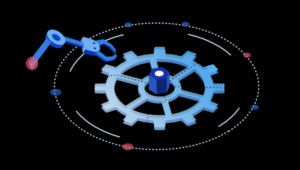Dynamic global functions in PHP
Like many others, I prefer to use procedural PHP as a template language. While PHP’s syntax makes it a practical choice for this, there is a problem with embedding dynamic content. Most PHP applications produce HTML output, so you end up writing <?php echo htmlspecialchars($foo);?> a lot, using this technique. Or you forget it, and make your application prone to all sorts of nasty XSS attacks.
Apart from the annoyance of superfluous typing, there is a danger of getting lazy, seeing that <?php echo $foo;?> is remarkably shorter to type. In some situations, it won’t manifest itself as a problem either, since some content-types never contains HTML special characters (Numbers for example). This is particularly nasty, because errors in the view layer are notoriously hard to track down, and unlike SQL-injections — a similar problem — the consequences tend to hurt the users of a site, rather than the site directly.
KISS
Recently, I had a look at some code, written for CakePHP. My eye caught a function e, which is shorthand for echo. A single letter, regular function is undoubtedly the simplest way to extend PHP’s syntax. Thinking about it, it’s fairly obvious, but it just never occurred to me.
Well, the CakePHP developers made a mistake, as it should have been shorthand for echo htmlspecialchars. Nonetheless, the syntax works well. So I began using a globally defined function which looks a bit like this:
function e($string) {
echo htmlspecialchars($string);
}
And it works too. It saves me typing and keeps me from forgetting to escape output, because I have to do more work to output strings unescaped, than not. Simple, but powerful.
The clash
There is a problem though; Since this is such a good name for a function, chances are that someone else would use it for something different, or perhaps even for the same. I already know of at least one potential nameclash, since I got the idea from CakePHP.
The usual way of dealing with this, would be with namespaces, but — alas — PHP doesn’t have namespaces (yet), and the common solution of pseudo namespaces (Eg. prefixing names) doesn’t work here, since it would defy the purpose of the function in the first place.
There’s another problem too. In the few cases, where we aren’t rendering HTML/XML output, we don’t want to escape strings for embedding in HTML/XML — instead, we want to escape it for embedding in that target language. Even in HTML, it may be necessary to escape strings with htmlentities, rather than htmlspecialchars, if the text encoding isn’t ISO-8859-1. Or encode the string to UTF-8, if the template is in UTF-8.
Making the static dynamic
The problem with all this is, that the function is static — That’s the nature of global functions in PHP. Other interpreted languages allows us to redefine functions at runtime, but no such luck with PHP (Well, strictly speaking, runkit allows it, but no-one in their right mind would use it in a production environment).
There is however a loophole; Using a callback, we can delegate to a dynamically defined handler:
if (!function_exists('e')) {
function e($args) {
$args = func_get_args();
return call_user_func_array($GLOBALS['_global_function_handler_e'], $args);
}
}
Much better — Now I can define my own output handler as:
$GLOBALS['_global_function_handler_e'] = 'my_global_function_handler_e';
function my_global_function_handler_e($string) {
echo htmlspecialchars($string);
}
And CakePHP can use:
$GLOBALS['_global_function_handler_e'] = 'cakephp_global_function_handler_e';
function cakephp_global_function_handler_e($string) {
echo htmlspecialchars($string);
}
We’re still using a global symbol, but at least it’s dynamic, rather than static.
So here’s a plea to framework writers in the PHP world: If we could all agree to do this for any function, defined in the global scope, which has an obvious risk of nameclashing, I think we would all be better off.
Just a humble suggestion of course.
Frequently Asked Questions (FAQs) about Dynamic Global Functions in PHP
What is the significance of global functions in PHP?
Global functions in PHP are crucial because they can be accessed from any part of the script, regardless of the scope. This means that you can define a function once and use it in multiple places in your code, enhancing code reusability and reducing redundancy. They also help in organizing your code better, making it easier to read and maintain.
How do I define a global function in PHP?
Defining a global function in PHP is straightforward. You simply declare the function outside any other function or class. Here’s a simple example:function myFunction() {
echo "This is a global function.";}
You can call this function anywhere in your script after it has been defined.
Can I access local variables in a global function?
No, you cannot directly access local variables in a global function. Local variables are only accessible within the function they are defined. However, you can pass local variables as arguments to the global function if you need to use their values.
How can I access global variables inside a function?
To access global variables inside a function, you need to use the ‘global’ keyword before the variable. Here’s an example:$x = 5;function myFunction() {
global $x;
echo $x;}
In this example, the global variable $x is accessible inside the function.
What are superglobal variables in PHP?
Superglobal variables in PHP are built-in variables that are always accessible, regardless of scope. They can be accessed from any function, class or file without having to do anything special. Some examples of superglobal variables are $_GET, $_POST, $_SERVER, $_COOKIE, $_SESSION, etc.
How can I make a variable global in PHP?
You can make a variable global in PHP by defining it outside any function or class. Alternatively, you can use the ‘global’ keyword to make a local variable global. Here’s an example:function myFunction() {
global $x;
$x = 5;}
In this example, $x is a global variable.
What is the scope of a variable in PHP?
The scope of a variable in PHP refers to the part of the script where the variable can be referenced or used. There are two types of scope: local and global. Local variables can only be accessed within the function they are defined, while global variables can be accessed anywhere in the script.
Can I use global functions in object-oriented programming in PHP?
Yes, you can use global functions in object-oriented programming in PHP. However, it’s generally recommended to use methods (functions defined inside classes) for better encapsulation and data hiding.
What is the $GLOBALS array in PHP?
The $GLOBALS array in PHP is a superglobal variable that contains references to all variables which are currently defined in the global scope of the script. It can be used to access global variables from anywhere in the PHP script.
Can I override global functions in PHP?
No, you cannot override global functions in PHP. Once a function is defined, it cannot be redefined or overridden. However, you can create a new function with a different name that performs a similar task.
Troels has been crafting web applications, as a freelancer and while employed by companies of various sizes, since around the time of the IT-bubble burst. Nowadays, he's working on backend systems for a Danish ISP. In his spare time, he develops and maintains Konstrukt, a web application framework for PHP, and is the organizer of a monthly PHP-meetup in Copenhagen.
Published in
·Bootstrap·Cloud·Miscellaneous·Open Source·Patterns & Practices·PHP·Programming·Web·June 20, 2014




